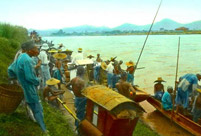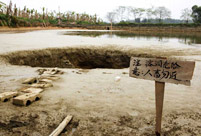

DAR ES SALAAM, April 24 -- The Tanzania-Zambia Railway Authority (TAZARA) on Sunday announced the appointment of the new managing director who pledged to revive the 1,860-kilometre Chinese-built railway line.
TAZARA said in a statement that Zambian Bruno Tandeo Ching'andu has taken up his appointment and planned to turn around the railway line running from Tanzania's commercial capital Dar es Salaam to New Kapiri Mposhi in Zambia.
Ching'andu replaced Ronald Phiri who was appointed in April 2013 to act as Managing Director for an interim period of three months, although he stayed at the helm for three years, as the shareholders sought a suitable candidate to replace him, said the statement.
"I have been appointed as Chief Executive Officer (CEO) of this company, to turn it around, not to try. We must turn it around. We, together, will turn this organization around," he said when he was introduced to the Executive Management Committee of TAZARA in Dar es Salaam.
Upon his appointment, Ching'andu addressed one of the burning issues at TAZARA, concerning the non-payment of salaries for its employees, declaring that it was criminal to keep workers unpaid for months and prodded TAZARA's managers to ensure that enough revenue was generated to pay the workers because it was the managers' responsibility.
"As TAZARA management, it is our responsibility to ensure that we earn enough money to pay ourselves and pay the workers. In fact, my most important asset in this organization are the workers. We have to find a way of motivating our workers," he said.
Ching'andu warned the managers that they would be kicked out of the authority unless they performed satisfactorily.
"I refuse to pay people, to keep people on account of attendance. You will not remain at TAZARA by attending TAZARA. You will remain at TAZARA by performing," he cautioned the managers.
TAZARA has been going through turbulent times for many years now, but hit the lowest ebb in the last financial year 2014/2015, when only about 88,000 metric tons of freight were transported, the lowest figure recorded since 1976 when TAZARA operations officially began.
In November last year, TAZARA received four new diesel-electric mainline locomotives and 18 new passenger coaches valued at 22.4 million U.S. dollars.
The new equipment was expected to register a substantial impact on the operations of TAZARA, which has been struggling from diminished capacity due to aged equipment.
Aged between 25-30 years, most mainline locomotives that are currently in operation have outlived their life spans and are frequently breaking down, a situation that has been exacerbated by the authority's failure to adhere to maintenance schedules due liquidity challenges.
Over the years, the passenger service operational levels had dropped drastically to the very minimum, where four trains per week with barely 455,000 passengers were transported in the 2014/2015 financial year, compared to ten years ago when the authority used to run six trains per week and convey more than 900,000 passengers annually.
TAZARA was constructed as a turnkey project between 1970 and 1975 through an interest-free loan of 1.1 billion yuan (around 138 million dollars) from the People's Republic of China, with commercial operations starting in July 1976, covering 1,860 kilometres from Dar es Salaam in Tanzania to New Kapiri Mposhi in Zambia.
 The evolution of J-10 fighter
The evolution of J-10 fighter Top 10 Asian beauties in 2016
Top 10 Asian beauties in 2016 What's happening in Xisha Islands?
What's happening in Xisha Islands? When female soldiers meet flowers
When female soldiers meet flowers North Sea Fleet conducts drill in West Pacific Ocean
North Sea Fleet conducts drill in West Pacific Ocean Old photos record the change of Sichuan over a century
Old photos record the change of Sichuan over a century Breathtaking aerial photos of tulip blossoms in C China
Breathtaking aerial photos of tulip blossoms in C China Horrific: Pit swallows 25 tons of fish overnight
Horrific: Pit swallows 25 tons of fish overnight Vietnamese Su-30 fighters fly over Nanwei Island in South China Sea
Vietnamese Su-30 fighters fly over Nanwei Island in South China Sea Top 20 hottest women in the world in 2014
Top 20 hottest women in the world in 2014 Top 10 hardest languages to learn
Top 10 hardest languages to learn 10 Chinese female stars with most beautiful faces
10 Chinese female stars with most beautiful faces China’s Top 10 Unique Bridges, Highways and Roads
China’s Top 10 Unique Bridges, Highways and Roads Great service or too much
Great service or too much Reality show sparks anger after endangering relics
Reality show sparks anger after endangering relics Relocated farmers not provided government services
Relocated farmers not provided government services ‘Leftover Women’ don’t want to wear stereotyped labels, even proudly
‘Leftover Women’ don’t want to wear stereotyped labels, even proudlyDay|Week